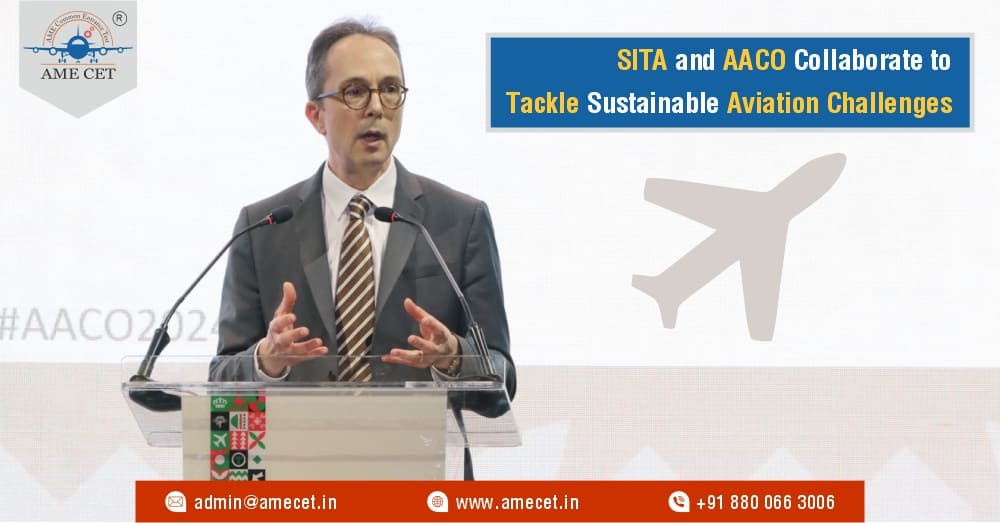
In a significant development for the aviation industry, SITA, a leading IT provider for the air transport sector, has announced a collaboration with the Arab Air Carriers Organization (AACO) to address the pressing challenges of sustainability in aviation. This partnership is expected to focus on various facets of the industry, including aircraft maintenance engineering, pilot training, and cabin crew training, which are crucial for enhancing operational efficiency and minimizing environmental impact.
The Importance of Sustainable Practices
As the global aviation sector grapples with the urgent need to reduce its carbon footprint, collaborations like that of SITA and AACO become increasingly vital. With major airlines like Air India, SpiceJet, Vistara, and Indigo leading the charge toward sustainability, the industry is looking for innovative solutions that can help achieve long-term environmental goals. This partnership aims to share expertise and develop best practices, particularly in areas such as aircraft maintenance and engineering, which are pivotal for optimizing operations and reducing emissions.
Aircraft Maintenance Engineering: A Key Focus Area
Aircraft maintenance engineering plays a crucial role in the sustainability of airlines. By ensuring that aircraft are maintained to the highest standards, airlines can improve fuel efficiency and reduce operational costs. The collaboration between SITA and AACO will likely emphasize the importance of skilled aircraft maintenance engineers in this process. The integration of advanced technologies in aircraft maintenance—such as predictive maintenance and real-time data analytics—can significantly enhance operational efficiency, leading to a more sustainable aviation model.
Moreover, the Aircraft Maintenance Engineering Common Entrance Test (AME CET), which serves as a gateway for aspiring aircraft maintenance engineers, is vital for nurturing talent in this field. By ensuring that the next generation of engineers is well-equipped with the knowledge and skills needed for modern aircraft maintenance, the industry can prepare for future challenges and advancements, including the shift toward sustainable aviation technologies.
Aeronautical Engineering and Innovation
Innovation in aeronautical engineering is another area where this collaboration could make a substantial impact. The development of new aircraft designs, materials, and propulsion systems can lead to significant reductions in fuel consumption and emissions. As Boeing and Airbus, the two giants of the aerospace industry, continue to invest in research and development, the integration of their innovations into the fleets of airlines like Air India and Vistara will be crucial.
The emphasis on sustainability also extends to pilot training and cabin crew training. By incorporating sustainable practices into training programs, airlines can ensure that pilots and cabin crew are not only skilled in their respective roles but also knowledgeable about the importance of sustainability in their daily operations. This holistic approach can foster a culture of sustainability within airlines, encouraging all staff—from ground crew to pilots—to contribute to reducing the environmental impact of air travel.
Ground Staff and Ground Crew Roles
Ground staff and ground crew are essential in supporting airlines' sustainability efforts. From managing aircraft on the tarmac to ensuring that maintenance checks are performed efficiently, their roles directly influence operational efficiency. Training programs that focus on sustainability practices can empower these teams to implement changes that reduce waste and improve resource management. By optimizing ground operations, airlines can further reduce their carbon footprint.
Collaborative Efforts Across Airlines
The collaboration between SITA and AACO is indicative of a broader trend in the aviation industry, where airlines are increasingly joining forces to tackle sustainability challenges. By sharing best practices and resources, airlines like Air India, SpiceJet, Vistara, and Indigo can collectively work toward common goals. This cooperative approach can lead to the development of industry-wide standards that promote sustainability across all aspects of aviation.
As airlines continue to face pressure from regulators and consumers to demonstrate their commitment to environmental responsibility, partnerships that focus on sustainability will become even more crucial. The success of these collaborations could pave the way for innovative solutions that not only benefit the airlines involved but also contribute to the global effort to combat climate change.
Looking Ahead: The Future of Sustainable Aviation
The SITA and AACO partnership is a promising step toward addressing the sustainability challenges faced by the aviation industry. With a focus on key areas such as aircraft maintenance engineering, pilot training, and cabin crew training, the collaboration aims to foster a culture of sustainability that permeates every aspect of airline operations.
As the industry moves forward, the integration of advanced technologies and innovative practices in aeronautical engineering will be essential. Airlines that prioritize sustainability will not only enhance their operational efficiency but also build trust with consumers who are increasingly concerned about the environmental impact of air travel.
In conclusion, the collaboration between SITA and AACO signifies a proactive approach to addressing the challenges of sustainable aviation. By focusing on critical areas such as aircraft maintenance and engineering, pilot training, and ground operations, this partnership has the potential to drive meaningful change within the industry. As airlines like Air India, SpiceJet, Vistara, and Indigo work together towards these goals, the future of sustainable aviation looks promising, paving the way for a more responsible and environmentally conscious air transport sector.
Category
-
Aircraft Maintenance Engineering (DGCA) (62)
-
(268)
-
Cabin Crew (1)
-
Aerospace Engineering (3)
-
Aeronautical Engineering (2)
-
Airport Management (5)
-
Aircraft Maintenance Engineering (EASA) (6)
-
Airport Ground Staff (1)
-
Commercial Pilot License(CPL) (51)
-
Aircraft Maintenance Engineering (BTech/BE) (1)
-
B.Sc. in Aviation (1)
-
AME CET (5)
